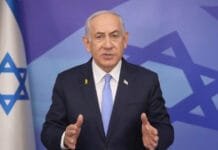A Historic Breakthrough in Middle Eastern Diplomacy
In a groundbreaking announcement, Israel’s Foreign Minister Eli Cohen recently disclosed that after restoring diplomatic ties with Saudi Arabia, at least seven Muslim-majority nations are poised to officially recognize Israel. This diplomatic gesture, aimed at fostering a new paradigm of peace in the region, not only signifies an evolution in international relations but also reconfigures the geopolitics of the Middle East.

Ongoing Dialogues: Saudi Arabia as the Catalyst
One of the most compelling aspects of this revelation is that Saudi Arabia, a significant powerhouse in the region, seems to be leading the charge. In an interview with Fox News Channel, Saudi Arabia’s Crown Prince Mohammed bin Salman corroborated that talks with Israel were nearing their final stages. By engaging in these diplomatic endeavors, Saudi Arabia is extending an olive branch that may reshape the regional landscape.
[ez-toc]
The Veil of Secrecy: Undisclosed Details
Foreign Minister Eli Cohen has been cryptic about the specifics of the ongoing discussions between Saudi Arabia and Israel. While the minister has confirmed that talks are in progress, he also emphasized that certain details are not yet ready for public consumption. This cautious approach, while stirring curiosity, underscores the sensitivity and complexity of these negotiations.
Why This Matters: The Multifaceted Significance of Cohen’s Statement
Cohen’s announcement holds weight for various reasons. It signals a potential shift in alliances and opens up opportunities for collaborative projects, such as infrastructure and counter-terrorism efforts. Moreover, the endorsement from Saudi Arabia serves as a de facto nod from one of the most influential Muslim countries, paving the way for others to follow suit.
Looking Ahead: The Dawn of a New Peace Deal
What Eli Cohen termed as a “new kind of peace deal” could be a watershed moment in Middle Eastern politics. By bringing these Muslim-majority countries to the diplomatic table, Israel not only enhances its own regional standing but also contributes to a broader peace agenda. Such diplomatic inroads could potentially usher in an era of increased stability and prosperity for all involved nations.
Conclusion: A Sea Change in Regional Politics
The news of seven Muslim-majority countries potentially recognizing Israel, following the footsteps of Saudi Arabia, is nothing short of revolutionary. As dialogues mature and more details emerge, the world will be keenly watching how this diplomatic orchestra fine-tunes its performance. One thing is certain: the move could significantly recalibrate Middle Eastern geopolitics, engendering a more peaceful and cooperative environment.
So, as we await further developments, the Foreign Minister’s announcement serves as a promising prelude to a more harmonious chapter in Middle East relations.















